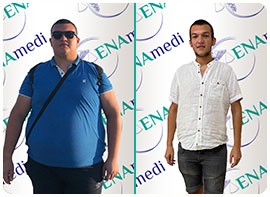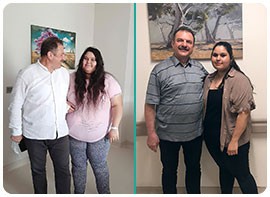Contact
- Osmaniye mah. Osmaniye mektebi sok. No:27/B Bakırköy/İSTANBUL TÜRKİYE
- [email protected]
-
+90 212 916 1 362
WHAT IS SLEEVE GASTRECTOMY?
The most commonly applied bariatric surgery method today is sleeve gastrectomy, which is commonly known as "stomach reduction surgery".
In sleeve gastrectomy surgery, the stomach is turned into a long, thin tube like a banana. Gastric sleeve gastrectomy operations are generally performed laparoscopically under general anesthesia to cut and removed 80% of the stomach. The aim is this way, to restrict the food intake of the stomach. In addition, sleeve gastrectomy surgery has the effect of reducing food absorption, though at a very low level.
The appetite of those who had gastric sleeve surgery decreases. In addition, insulin resistance is broken even without weight loss yet.
HOW LONG DOES THE STOMACH REDUCTION SURGERY TAKE?
The post-operation risks are low and some undesirable side effects are very rare in the sleeve gastrectomy surgeries, which takes about 1.5 hours, since the continuity in the digestive system is maintained as the inlet and outlet parts of the stomach are protected.
CAN A SLEEVE GASTRECTOMY BE APPLIED IN ALL WITH OBESITY?
People who want to have sleeve gastrectomy surgery are expected to meet certain criteria. These include:
Having a body mass index over 40 (morbidly obese, that is, severely obese).
Those who have a BMI between 35 and 40 and have obesity-related problems such as type 2 diabetes, hypertension, and sleep apnea are considered morbidly obese and may need to undergo stomach reduction surgery.
In addition, patients with "new" type 2 diabetes and metabolism disorders associated with obesity and BMI values between 30 and 35 can be operated with the decision of our obesity specialists.
Contrary to popular belief, obesity surgeries are performed not only for aesthetic purposes, that is, to make the person look thinner, but also for a healthier life.
WHO CANNOT HAVE SLEEVE GASTRECTOMY?
Those with severe psychiatric disorders or psychiatric disorders which is not under treatment,
Those with drug or alcohol addiction,
Patients with severe hormonal and endocrine disorders,
Patients who cannot make the necessary dietary and lifestyle changes after surgery,
Those who have a disease that will prevent him/her being anesthetized,
Patients with some types of cancer,
Those who are planning a pregnancy for the near future are generally not eligible for sleeve gastrectomy.
WHAT ARE THE ADVANTAGES OF SLEEVE GASTRECTOMY?
Sleeve gastrectomy not only leads to high weight loss but also has many advantages. Some of them include:
It does not disturb the anatomical structure and the natural direction of food flow,
The technique that is used by it is simpler and the complication rates are lower than those of the other methods.
Anatomy, intestinal structure, direction of the physiological flow of foods are not disturbed,
No dumping syndrome and ulcer occur,
The secretion of the appetite hormone called ghrelin decreases, which, in turn, results in the appetite decreases from the first day,
There is no need for a life-long supplementation of vitamin/mineral.
In any case, the entire stomach can be viewed with the help of endoscopy.
Since the pyloric muscle of the stomach is kept, a feeling of stuffing up and satiety occurs.
WHAT ARE THE DISADVANTAGES OF SLEEVE GASTRECTOMY?
Sleeve gastrectomy operations also have some disadvantages though fewer than those of other stomach operations. Some of them include:
Being irreversible.
Having a weaker effect of weight loss and recovery from concomitant diseases than gastric bypass and duodenal switch, which cause malabsorption.
WHAT IS THE APPROPRIATE AGE TO HAVE SLEEVE GASTRECTOMY?
Sleeve gastrectomy, which is generally known as one of the methods applied to obese people between the ages of 18 and 65, can also be applied to people who are under the age of 18 or over the age of 65 in certain cases. In the obese people who are under the age of 18 or over the age of 65, surgery may be considered appropriate, depending on the degree of obesity and other obesity-related diseases.
WHAT HAPPENS IF I GAIN WEIGHT AGAIN AFTER SLEEVE GASTRECTOMY?
Revision surgeries are operations performed due to different complications such as regain of weight, stenosis or leakage after obesity surgery. The most important reason for revision surgeries is usually regain of weight.
The underlying reasons for patients' regain of weight are the insufficient follow-up of the patients, insufficient information of the patients or their failure to comply with the process even if they are aware of the importance of it. For these reasons, 20 to 30% weight gain may occur in patients.
It is critical to select the revision surgeries applied to the patients well. These surgeries are technically more difficult and must be performed by our surgeons experienced in the field of obesity. Today, revision surgeries have also increased with the increase in the number of obesity surgeries.
There are types of surgery recommended for patients who have relapsed co-morbidities such as diabetes, high blood pressure, or regain weight. The most appropriate type of surgery should be decided upon discussion and evaluation with the patient.
IS THERE PAIN/SUFFERING AFTER SLEEVE GASTRECTOMY?
Today, sleeve gastrectomy surgeries performed by using laparoscopic methods are completed with milimetric incisions. In the surgeries performed by this method, also called closed surgery, post-operative pain or suffering is much less than that in the past.
WHEN CAN I RETURN TO MY DAILY LIFE AFTER SLEEVE GASTRECTOMY?
In sleeve gastrectomy surgeries, the patient starts to feel better on the next day of the surgery, but it should remembered that this surgery is a major procedure and therefore one should err on the side of caution. Although the patients feel well, our physicians generally recommend our patients to be more cautious during the 1-week period following the operation.
IS THERE A SCAR LEFT AFTER SLEEVE GASTRECTOMY?
Since the surgery is performed with a closed method, only very small incision scars remain in the abdomen. The scars completely disappear in a few months.
HOW MUCH WEIGHT IS LOST WITH SLEEVE GASTRECTOMY?
Those who have sleeve gastrectomy usually lose 60 percent of their excess weight 5 years after the operation. This method is almost as effective as gastric bypass in losing weight. Continuous vitamin and mineral supplementation is required after sleeve gastrectomy as the absorption disorder is less compared to bypass.
If sleeve gastrectomy loses its effect in the long run and weight is regained, gastric bypass is generally preferred as the next surgical method.
HOW MANY DAYS DO I HAVE TO STAY IN THE HOSPITAL AFTER SLEEVE GASTRECTOMY?
Internationally recommended hospital stay for sleeve gastrectomy is 3 days.







